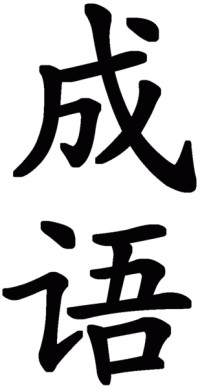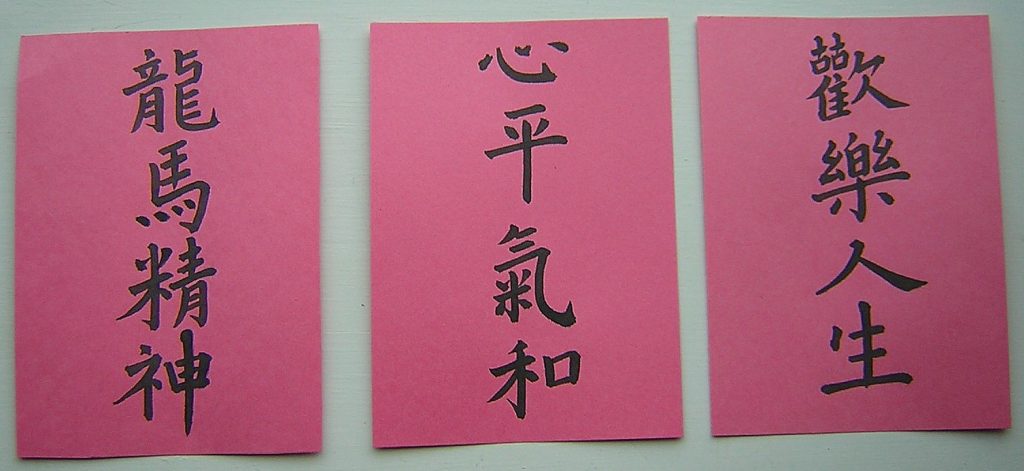Idioms Explained Posted by Stephen on Sep 24, 2011 in Vocabulary
 Idioms or 成语 (chéng yǔ) are very prevalent in Chinese writing and even in common day sayings. Much like idiomatic expressions used in English, the Chinese equivalents are an amalgam of history, cultural influences and scholarly debate, imparted upon Mandarin and Cantonese over thousands of years. Further, because Chinese and English are the two largest vocabulary-based languages in the world, the range of idiomatic phrases and proverbs is especially vast and deep or 深刻 (shēn kè).
Idioms or 成语 (chéng yǔ) are very prevalent in Chinese writing and even in common day sayings. Much like idiomatic expressions used in English, the Chinese equivalents are an amalgam of history, cultural influences and scholarly debate, imparted upon Mandarin and Cantonese over thousands of years. Further, because Chinese and English are the two largest vocabulary-based languages in the world, the range of idiomatic phrases and proverbs is especially vast and deep or 深刻 (shēn kè).
In ancient China, a scholar’s merits were not simply based upon what the meaning of his prose, but also based upon how he would convey it. Poetry and pictographic expressions which highlighted an artistic nature of the literature was also required for a scholar to gain recognition. As a result, these four character idiomatic expressions (which appeared balanced in written symmetry) entered vernacular language 白话,and has been spoken since (due to yet again the balance of syllables arising from a four character phrase).
Most newcomers or intermediate learners of Chinese often have trouble remembering and learning Chinese idioms because of the inherent structure of Chinese idioms. While you may understand characters or words that make up an idiom, non-natives often have trouble making sense of these truncated expressions.
The difficulty in learning and memorizing these phrases arises from the disconnect between idiomatic expressions and basic Chinese language structures. Often times, four character idioms are a collection of partial verb-object phrases that have been whittled down to one basic character and combined with three other characters following suit. Not following? Let me explain it this way:
Take the idiom “practice makes perfect” or 熟能生巧 shúnéngshēngqiǎo. 熟能 is not a normal verb-object word in Chinese, but both 熟 and 能 are partial verb-object phrases from larger words 熟悉 (to be familiar with) and 能力 (ability to do). However, taking their broader meaning together (to be familiarly able at something) the phrase starts to make sense. Further, the two character phrase 生巧 is not a Chinese word following the verb-object pattern. Yet separately, 生 means to create or give birth and 巧 means highly skilled or proficient. Now put all four together and “familiarity through doing creates high proficiency” or “practice makes perfect”.
Here’s another one with a similar meaning, 勤学苦练 (qínxuékǔliàn):
The trick is to learn your 汉字 and become familiar with basic component of words to expand your vocabulary. Once you’ve entered about 250-500 independent characters into your repertoire, you’ll be able to break down and figure out these 成语 phrases without having to turn to a dictionary or ask a 朋友.
Remember, 熟能生巧! So keep at it.
Idiom vocab:
一举两得 (yìjǔliǎngdé)–“kill two birds with one stone”
宽容待人 (kuānróng dàirén)–“live and let live”
塞翁失马 (sàiwēngshīmǎ)– literally the old frontiersman losing his horse or “a blessing in disguise”
勤学苦练 (qínxuékǔliàn) — study diligently and train hard
吹毛求疵 (chuīmáoqiúcī) –“find fault in something”
熟能生巧 (shúnéngshēngqiǎo) –“practice makes perfect”
Follow Steve on twitter: @seeitbelieveit

Build vocabulary, practice pronunciation, and more with Transparent Language Online. Available anytime, anywhere, on any device.
About the Author: Stephen
Writer and blogger for all things China related. Follow me on twitter: @seeitbelieveit -- My Background: Fluent Mandarin speaker with 3+ years working, living, studying and teaching throughout the mainland. Student of Kung Fu and avid photographer and documentarian.





Leave a comment: